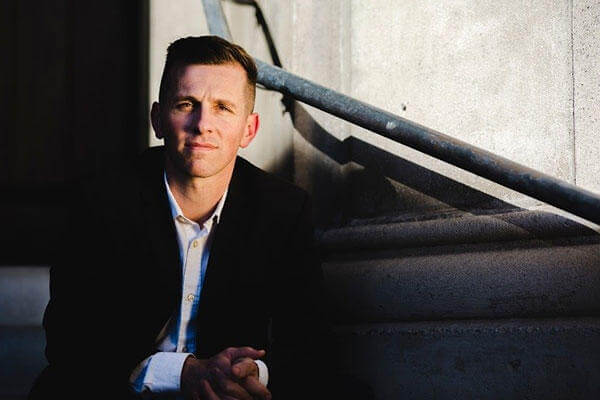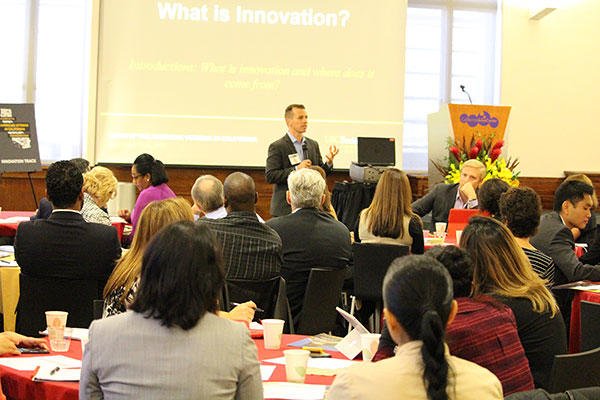"My drive comes from frustration. Frustration with the status quo, with a society that seems more and more isolated or, as we say, independent. I see people coming home to disconnected communities hoping for peace."
So says Nathan Graeser, Army National Guard social worker and veteran activist affiliated with the University of Southern California. I first met Graeser in Los Angeles last year where I was fortunate and honored enough to share the stage with individuals such as Mayor Eric Garcetti; Gen. (ret.) David Petraeus; Dan Goldenberg, executive director of the Call of Duty Endowment; and others on the quest to drive awareness for veteran employment.
Specifically, we were there to highlight the mission to hire 10,000 veterans in the Los Angeles region. When Graeser walked in with the USC team, it was refreshing to see a fiery service member who was both scrappy and articulate in the fight.
I later learned he was not just a social worker, but someone with an incredible journey.

Q.: What is your role now?
A.: "I am the community engagement director for our center. Functionally, that means my role is to run our L.A. veterans collaborative, speak on behalf of the center and work to organize L.A., the state and nation around our data and work."
Q.: Why did you choose social work?
A.: "When I chose social work, I was already a chaplain in the Guard, but felt unprepared and wanted to help people who were suicidal. Having a few close calls got me thinking I needed more training as an MSW [master's in social work]. Only later did I realize I might be able to use my passion and experience to influence more people than just in a clinical setting."
Q.: What was your path to get here?
A.: "I suppose, like most, I found my way to social work by being broken by the world around me. It has always felt wrong to send people home from war with aching, untreated wounds. I knew I wanted to help people in 2005 when my unit returned from Afghanistan, where my best friend was blown up. I just didn't know what yet.
"Someone told me that's what chaplains do, so I said I guess I'll be one of those. I knew I wanted to help [alleviate] the pain I saw. That's what I call my 'pearl' -- my frustration or grain of sand that keeps rolling around in my shell until I can alleviate some of it."
Q.: How are you connected to USC?
A.: "I'm connected to USC both through schooling and passion. I graduated from the Military MSW program and fell in love with the commitment to innovation and communication. The community is pretty fun, too. I cut my teeth on the program as a community organizer, part of our center here at USC CIR [Center for Innovation and Research on Veterans and Military Families].
"While here, I started my doctorate in social work, focusing on innovation and social change, and am set to graduate in 2018."
Q.: This is a unique choice. What was the internal drive that helped you to pick this route?
A.: "As I mentioned, I think my drive comes from frustration. Frustration with the status quo, with a society that seems more and more isolated or, as we say, independent. I see people coming home to disconnected communities hoping for peace. I hope to create communities that do the opposite and create the conditions for healing."

Q.: How has your military experience influenced your position now?
A.: "My service reminds me of two things. 1) I learned as an enlisted soldier that leadership is not about position. It's about influence. Your ability to articulate and stand for what's right will get you that. 2) I know that behind every passionate person is someone who encourages and protects that fire. That's my family and wife. I still serve in the California Army Guard at my family's pleasure."
Q.: What would you like the public to better understand?
A.: "I want the public to know the costs of war. I know the narrative is that we ask veterans to do that for us, but this model only works when people can create space for these experiences to filter into society. The loss of innocence and sometimes faith in the human condition can only be healed through shared or communal grief.
"I want people to know that they have a role in these wars, whether the U.S. government is asking or not, and that's to listen, care and speak out on their behalf. Vets have a responsibility to share as well, allowing the community to bear the weight of the war, not just us. Communities can't do that, though, if they don't know where we are."
Q.: Anything else you would like us to know?
A.: "After doing this work for the last five years, many of these problems stem from a lack of local connection. That's why I am going after the transition process -- asking the DoD to allow sergeant majors [SMs] to connect with their community when they come home. We are formally asking for a pilot here in L.A. If DoD says no, then we are going to explore other legal options. It's just been too long doing the same thing and hoping for different results."
Find the Right Veteran Job
Whether you want to polish your resume, find veteran job fairs in your area or connect with employers looking to hire veterans, Military.com can help. Subscribe to Military.com to have job postings, guides and advice, and more delivered directly to your inbox.











